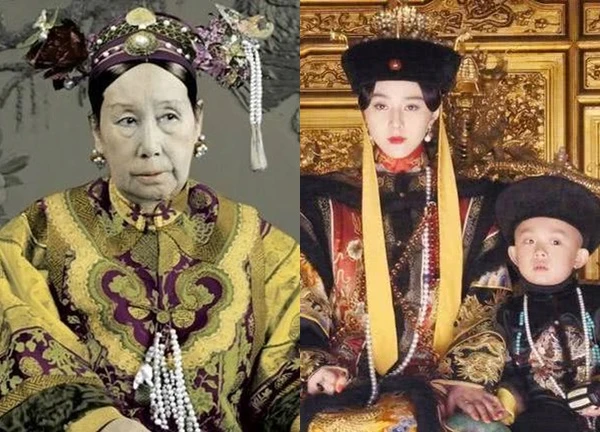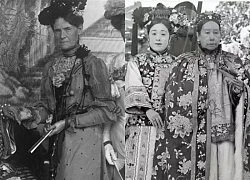Diep Kha officially gave birth, Angelababy's son was threatened with losing his 35 trillion inheritance?

4 | 0 Discuss | Share
There is a surname in China that is classified as rare and people who bear this surname will often have trouble in life. However, behind it is an extremely "sublime" origin.
According to Sohu, the surnames in China all have their own stories and origins. Even surnames in this country often come from their own origins, related to their professions, the geographical location of their families or ancient legends, from which they can feel the value of family heritage.
Illustrative photo.
However, in China's kinship culture, there are some surnames with their own unique style that are extremely different from other common surnames. Worth mentioning, in this country, there are also rare surnames that are not "cool" at all for boys or girls. For example, the surname Gui. With a strange meaning, the Chinese surname Gui has a special historical origin. However, in today's society, this surname is gradually disappearing.
"'740;" - GuÇ is a Chinese character that has been recorded in oracle bone inscriptions as early as the Shang Dynasty. The shape of the hieroglyphic alphabet is very strange, like the strange shape of a human body with a large head. In ancient beliefs and religions, the word was often associated with death and the soul, making people terrified and terrified to hear.
It even symbolizes the blurring of the line between life and death, implying the mystical world after death. The cultural symbols contained in the word "'740;" are so profound and diverse, it plays a unique role in the Chinese character system.
However, "'740;" is not just a word, but also a rare surname in China. The history of this family can be traced back to ancient times, it once symbolized the rise and fall of a family and contained the heritage of this family. However, in today's society, the surname GuÇ (Devil) is gradually becoming rare and many people with this surname are struggling.
People with the surname Gui often face many difficulties.
Moreover, compared to ancient religious culture, modern society tends to stay away from words related to "devils". The surname has gradually disappeared during the census but still contains precious memories of ancient culture and history.
Surname '740;" – GuÇ (Demon) is like a thousand-year mystery, its origin is causing speculation. There are many legends about the origin of this surname. First of all, there is a theory that the surname '740;" – GuÇ (Devil) originated from the spiritualists of the Xia Dynasty.
Illustrative photo.
These psychics were believed to be able to communicate with ghosts and were intermediaries in the ancient supernatural world. They are considered divine beings, whose mission is to connect with the spirit world. To demonstrate their mysterious mission, they chose the surname '740;" – GuÇ (Demon) and were entrusted with the mission of connecting with the supernatural world.
The second theory, that the surname is believed to be derived from the ancient surname Jiang, which may have been derived from the surname Gui, a descendant of Emperor Yan. In particular, Guiyu County (in Guangdong) is considered the birthplace of the ancient Medicine of the Five Elements.
Illustrative photo.
Their origin '740;" – GuÇ (Demon) not only carries the glory of the clan but is also the inheritance of ancient culture and medical wisdom. Members of this family may have made outstanding contributions to the field of ancient medicine, their names have become a part of the history of medicine, and ancient wisdom has been passed on.
The third theory, the surname GuÇ (Devil) may also have originated from the Gui Fang family in the northwestern region during the Shang and Zhou dynasties. This origin reflects the understanding and respect for life, death, and souls of the ancients.
Illustrative photo.
In ancient society, people had deep beliefs and fears of supernatural phenomena such as spirits, death, demons, and gods, and the surname GuÇ (Demons) could be a product of this belief. This legend reveals the integration of ancient cultures that make them carry the history of many cultures.
No matter how you say it, the GuÇ (Devil) family is the quintessence of ancient culture. It represents human thought and respect for life and death, demons and the supernatural world, which is the memory of an era. Despite its profound cultural significance from ancient times, the surname is gradually becoming rare in modern society, and many people with the surname GuÇ (Devil) face the difficulty of choosing a name.
Demon Cup.
There is a character who also bears the surname Devil, which is famous both in China and in the world. However, this person suddenly disappeared and to this day, no one knows the reason. It was the Demon Cup.
Demon Guzi is one of China's characters with endless knowledge. Almost every realm of the Devil Guzi knew. Although he did not put forward any major policies, the Devil Coc Tu trained many important figures in the Spring and Autumn and Warring States periods, echoing the list of ancient Chinese history books.
To this day, the true identity and identity of Demon Coc Zi is still a mystery that no one has ever answered. Worth mentioning, except for the disciples, no one had seen the Demon Cup. Therefore, there is an opinion that this is a character who can only be found in word of mouth.
Girl forces fiancé to experience labor pain before wedding, gets bitter ending for life  Hoa Chỉ15:32:08 27/02/2025A woman in China forced her fiancé to experience the pain of giving birth, and she adjusted the machine herself. The result was a bitter and unforgettable experience for her and she received outrage from the online community.
Hoa Chỉ15:32:08 27/02/2025A woman in China forced her fiancé to experience the pain of giving birth, and she adjusted the machine herself. The result was a bitter and unforgettable experience for her and she received outrage from the online community.

4 | 0 Discuss | Share

3 | 0 Discuss | Share

1 | 0 Discuss | Share

1 | 0 Discuss | Share

3 | 0 Discuss | Share

1 | 0 Discuss | Share

2 | 0 Discuss | Share

4 | 0 Discuss | Share

1 | 0 Discuss | Share

1 | 0 Discuss | Share

3 | 0 Discuss | Share

5 | 0 Discuss | Share




3 | 0 Discuss | Report